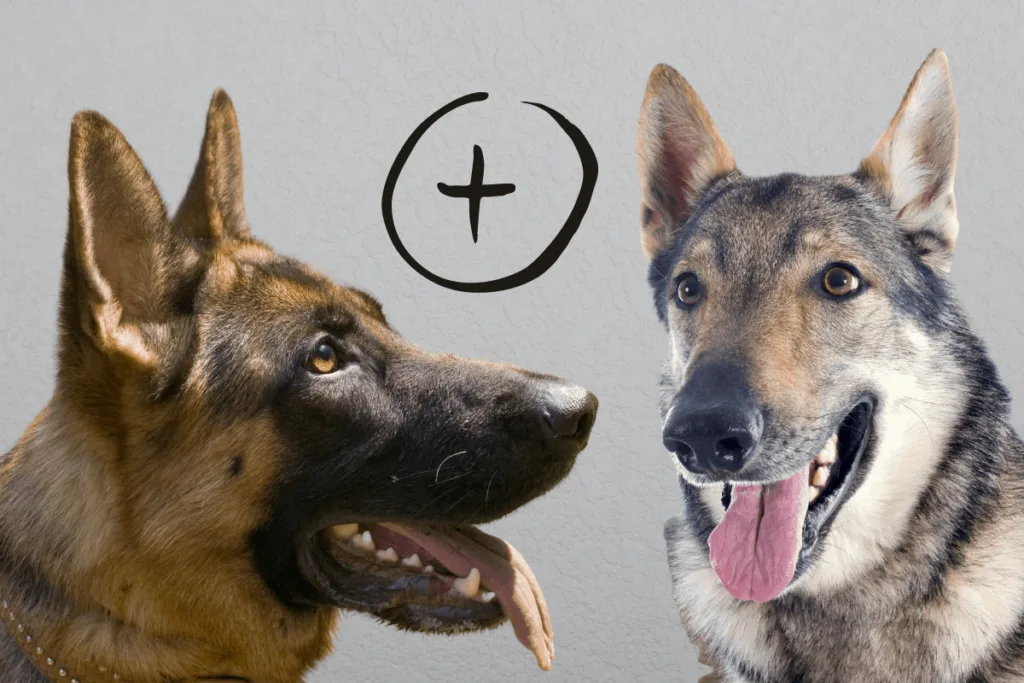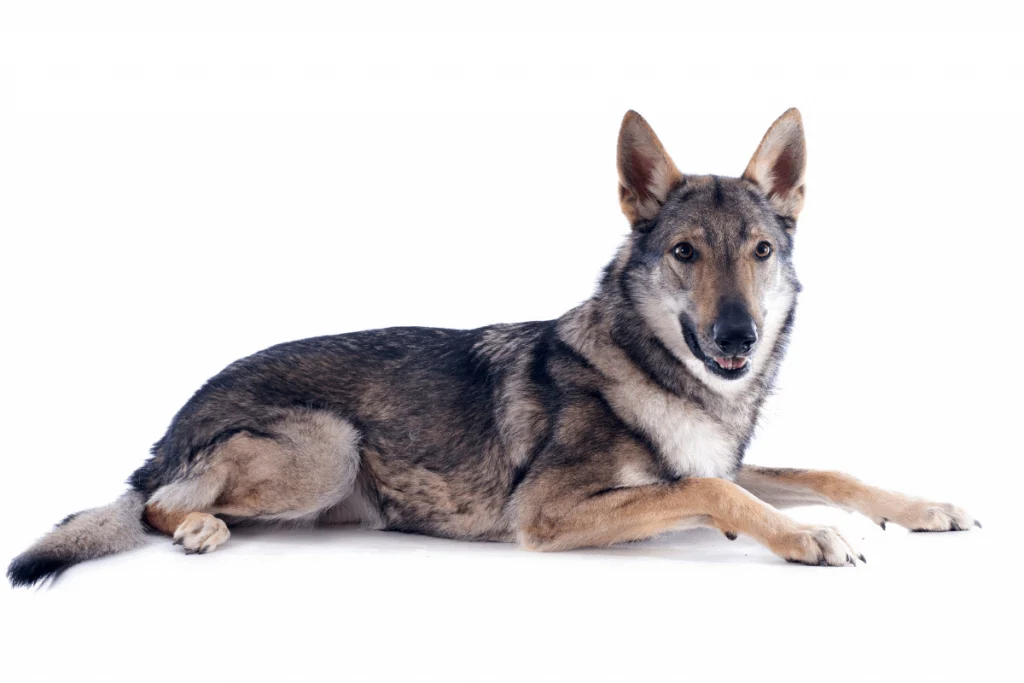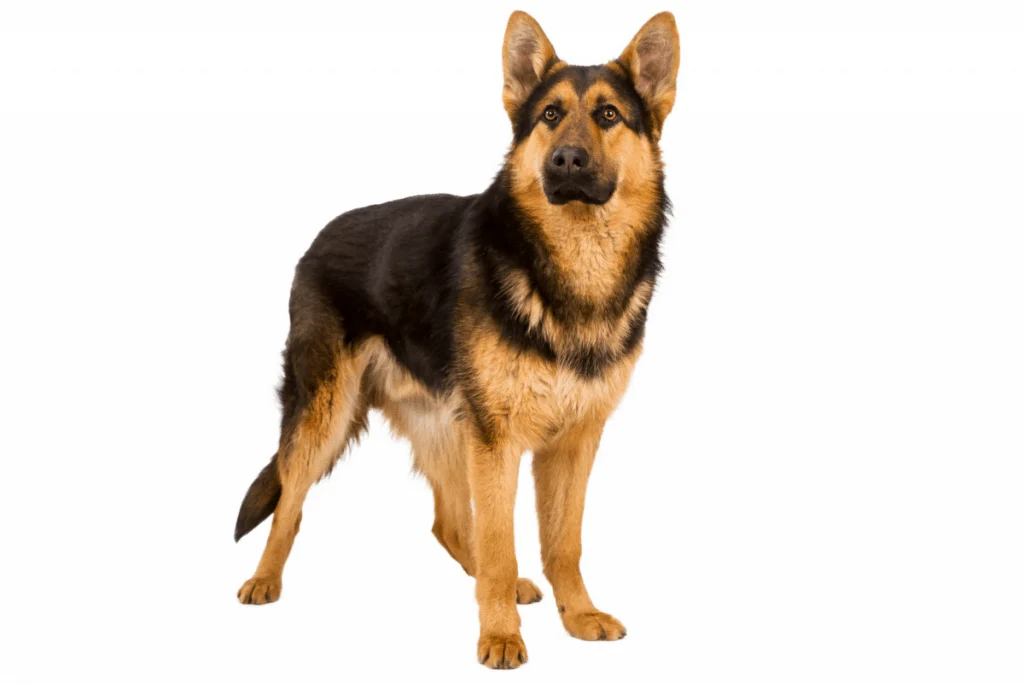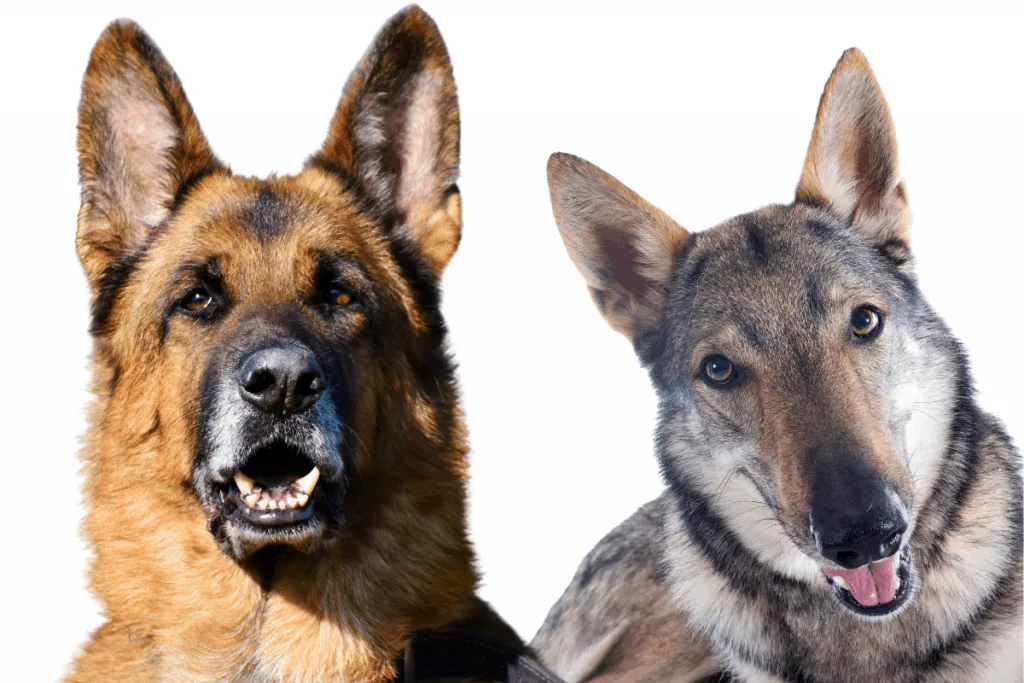
We know that you’ve heard of a German Shepherd, but what about a Czechoslovakian Wolfdog (also known as a Czechoslovakian Vlcak)? What kind of dog does a mix between these two amazing breeds produce?
The Czech Wolfdog German Shepherd mix is a cross between a Czechoslovakian Wolfdog and a German Shepherd. As such, it tends to exhibit a combination of qualities from both parent breeds. Czech Wolfdog German Shepherd mixes are intelligent, protective, high-energy dogs that require considerable training. However, their physical appearance can vary.
Let’s examine the Czech Wolfdog German Shepherd mix to discover what pet owners can expect after getting one. We’ll discuss this hybrid breed’s health concerns, temperament, nutritional requirements, and trainability.
This profile will help you decide whether the Czech Wolfdog German Shepherd mix is the right pup for you and your household.
Click Here to Jump to a Section
What Is a Czech Wolfdog German Shepherd Mix?
A Czech Wolfdog German Shepherd mix is a cross between the Czechoslovakian Wolfdog and German Shepherd Dog (GSD). It is not an officially recognized breed but rather a hybrid of two registered breeds. This makes it a rare designer pup.
Let’s discover what lies ahead for prospective pet parents looking to acquire this prized pup. To start, we’ll examine what traits the ideal Czech Wolfdog German Shepherd mix owner should exhibit.
Is a Czech Wolfdog German Shepherd Mix Right for Me?
The Czech Wolfdog German Shepherd mix is a fiercely loyal dog with plenty of energy to expend. It also happens to be a highly intelligent dog that requires consistent mental stimulation.
This hybridization also tends to exhibit a thick double coat of fur that requires daily brushing to remain clean and unmatted.
As such, there are three primary factors that potential pet owners should consider before getting a Czech Wolfdog German Shepherd mix. They are:
- Training Requirements
- Care Costs
- Time and Energy
Taking the time to honestly evaluate yourself against these factors could help you avoid a disastrous outcome.
Having to adopt-out a new puppy due to lifestyle or housing conflicts is heartbreaking for everyone involved, so it’s vital that you consider these aspects before getting a Czech Wolfdog German Shepherd mix.
Training Requirements
Czech Wolfdog German Shepherd mix pups might not be the best fit for first-time pet parents. They require consistent training and repetitive routines during their puppy years, and first-time dog owners may not possess the training knowledge to get the job done.
To better understand what it takes to care for a German Shepherd if you are a first-time dog owner, we urge you to read the following article – it will give you a true understanding of what GSD ownership involves:
Are German Shepherds Good First Dogs? Prepare Yourself!
Young dogs are notoriously prone to chewing on belongings, barking, and urinating/defecating indoors. If you’re not prepared to handle and correct this behavior, you have two options.
You could:
- Choose to take dog training classes in preparation for owning a Czech German Shepherd
- Choose to adopt an adult dog that is already well-trained
Almost all puppies are mischievous and require training, no matter the breed. But the Czech Wolfdog German Shepherd mix’s high energy levels and substantial smarts make it one of the most high-maintenance breeds when it comes to training.
Simply put, if you don’t have the willpower to learn training techniques, you may not be ready for a puppy. Additionally, you’ll need to set aside funds for care costs, both recurrent and emergency.
Be sure to check out the excellent article linked below to get an idea of what it takes to train a German Shepherd:
German Shepherd Training Guide: All You Need to Know
Care Costs
While hybrid breeds generally tend to suffer from fewer health conditions than their purebred parents, there are still quite a few potential health issues to consider when getting a Czech Wolfdog German Shepherd mix.
This breed tends to be medium or large-sized and may therefore suffer from the conditions commonly associated with larger breeds. This includes joint issues (including hip and elbow dysplasia), malnutrition, and obesity.
If you’re unable or unwilling to pay the veterinary costs associated with these conditions, your pup may suffer unnecessarily. As such, it’s vital to recognize the financial responsibility associated with bringing a Czech Wolfdog German Shepherd mix into your life.
This includes providing a nutrient-rich diet, plenty of exercise opportunities, and brain-stimulating toys.
In short, owning a Czech Wolfdog German Shepherd mix can be costly, especially over the long-term.
To understand the true costs associated with raising a German Shepherd puppy, we have a comprehensive article for you to consider right here:
How Much Does a German Shepherd Puppy Cost?
And for everything that you need to know about German Shepherd joint problems (very common to the breed), be sure to read:
German Shepherd Joint Problems: All You Need to Know
Time and Energy
If your schedule permits very little downtime, you might not want to bring a Czech Wolfdog German Shepherd mix into your life.
While the breed can be crate-trained and does relatively well when left on its own for several hours, it also requires daily walks, plenty of exercise, and near-constant mental stimulation.
If you’re not prepared or willing to put in the time and effort to keep your pup in tip-top shape, it may be worthwhile to investigate a lower-maintenance, low-key breed that does well with extended periods of isolation and little exercise.
However, if you’re someone who enjoys hiking, jogging, and spending plenty of time at home, this breed might be the right choice for you.
The potential relationship between an owner and Czech Wolfdog German Shepherd mix pup is a beautiful and meaningful one, but just like raising a child, you’ll need to be prepared for the time and energy drain.
This is especially true of younger dogs that are still in their puppy years. Fortunately, the more love, time, and energy you pour into your Czech Wolfdog German Shepherd mix, the more they’ll give back.
Czechoslovakian Wolfdog (Vlcak) and German Shepherd Facts
Understanding the Czech Wolfdog German Shepherd mix starts with understanding its parent breeds. That’s why we’re now going to give you some of the most fascinating and helpful Czechoslovakian Wolfdog and German Shepherd facts.
With this information at your disposal, you can form a more comprehensive understanding of the Czech Wolfdog German Shepherd mix and its many unique features. Let’s jump right in!
Czechoslovakian Wolfdog Facts

The Czechoslovakian Wolfdog is a distinctive breed that is notable for its wolf-like appearance and relatively long lifespan.
They first emerged in the 1950s as a product of an interbreeding experiment involving German Shepherd Dogs and the Carpathian Wolf.
However, the Czechoslovakian Wolfdog wouldn’t become a fully-recognized breed until 1982. While it is a relatively popular breed in Eastern Europe and Russia, the Czechoslovakian Wolfdog remains a somewhat unknown breed in North and South America.
Because of the Czechoslovakian Wolfdog’s origins, the German Shepherd Czech Wolfdog mix may exhibit more traits of the German Shepherd Dog than the Czechoslovakian parent.
Still, the resulting hybrid may enjoy some of the beneficial features of the Czechoslovakian Wolfdog, including a longer lifespan and a uniquely wolf-like appearance.
German Shepherd Facts

German Shepherds enjoy a storied history. Before they emerged as Germany’s primary dog breed, they were reasonably diverse and unstandardized.
Each German princedom had a distinctive shepherding breed, each type a result of hundreds of years of local breeding preferences.
But just as these princedoms would eventually join together into a unified empire, the shepherd breeds would soon become a standardized, unified breed.
This was not by chance. Rather, it was accomplished almost single handedly by a man named Captain Max von Stephanitz.
In the late 1880s, Stephanitz happened upon a particularly handsome German pup while attending a dog show. He purchased that dog (named Hektor Linksrhein) and immediately began to breed and interbreed the resulting pups.
Within a matter of only a few years, the German Shepherd Dog was a legitimate, registerable breed.
By the first decade of the 20th century, the German Shepherd had already made it across the Atlantic and into the American public’s much-interested view.
Since that time, the German Shepherd has been an exceptionally popular breed among Westerners. While this breed did experience a slight backlash during the World Wars due to their military usage, they’re beloved today for both their intelligence and protectiveness.
What to Expect With the Czech Wolfdog German Shepherd Mix
Before you can decide whether the Czech Wolfdog German Shepherd mix is right for you or not, you’ll need to first come to grips with this breed’s common traits.
It can be tricky to pin these characteristics down as there is a certain amount of variability within this hybrid breed.
Still, the majority of Czech Wolfdog German Shepherd mixes show traits belonging to both the Czechoslovakian Wolfdog breed and the German Shepherd Dog.
They tend to be full of energy, incredibly intelligent, and very loyal dogs.
Compare these characteristics against your personality and any household members’ traits to discover just how right this breed might be for you.
If you’re a high-energy person with love for training and a desire for loyal companionship, you might just be tailor-made to own one of these dogs.
High Energy
German Shepherd Dogs are an athletic breed that requires daily walks, frequent outings to the local dog park, and tons of exercise.
The Czechoslovakian Wolfdog breed is equally high-energy, likely due to centuries of all-day livestock herding.
Their hybridized pups are, therefore, extremely lively and energetic. When you invest in a Czech Wolfdog German Shepherd mix, you’re also investing in hours upon hours of hikes, playtime, fetch, and more.
For this reason, the breed is best-suited for active adults and families.
Intelligence
One of the perks of owning a Czech Wolfdog German Shepherd mix is trainability. These dogs tend to be intelligent and quick to learn, though reinforcement is key (especially when they’re very young).
This designer breed can learn your routines and schedule, helping to wake you up on time and alert you to danger.
Many people decide to acquire German Shepherd dogs after experiencing their loyalty and seeing how protective they can be.
Just like traditional German Shepherds, Czech Wolfdog German Shepherd mixes are equally willing to keep their human families safe from harm.
Protectiveness
Czech Wolfdog German Shepherd mixes tend to be just as loyal and loving as their parent breeds. While they can be troublesome for poorly trained pups (as they may bite strangers), it can be an absolute boon for the well-trained dog and owner.

Adults with children or security fears may particularly enjoy the protective nature of this breed. In general, shepherding dogs are gentle, loyal, and friendly animals that pair well with single adults, couples, and families.
Be sure to read the articles linked below to understand just how innate protection is to the German Shepherd breed and the potential dangers of it. It’s a natural thing, and this instinct must be tempered with consistent training:
Will My German Shepherd Protect Me Without Training?
German Shepherd Aggression: Why and What to Do About It
Health Concerns
Czech Wolfdog German Shepherd mixes can suffer from a wide range of health conditions. Fortunately, their mixed lineage reduces their chance of developing or being born with many of the following issues.
Still, due to their athletic body type and larger size, they’re prone to developing ailments common to larger breeds. Some of the most prevalent health concerns to watch for include:
- Hip Dysplasia
- Elbow Dysplasia
- Exocrine Pancreatic Insufficiency (EPI)
- Bloat
- Malnutrition
- Epilepsy
To help you better understand these potential pitfalls and health worries, we’ll need to take a closer look at each one.
And while there’s no guarantee that your future Czech Wolfdog German Shepherd mix will be able to avoid all of these issues, getting one from a reputable and registered breeder is a great first step to minimizing health risks.
Hip Dysplasia
Larger dogs can be wonderful companions, but they tend to live shorter lives. When they reach late adulthood, many larger dogs begin to experience symptoms of arthritis.
How Long Do German Shepherds Live? A Detailed Guide
In some cases, heftier pups may develop hip dysplasia in their youth, exacerbating the onset of arthritic joints.
Sadly, hip dysplasia is a common health concern for larger breeds. It occurs when the ball-shaped piece of bone that typically fits into the hip socket is malformed.
This strangely-shaped joint can irritate surrounding nerves and muscle tissue during any action (walking, running), resulting in significant pain and swelling.
In some cases, surgery may be able to correct hip dysplasia. Still, this option is expensive and not without its risks.
It’s often better to actively prevent the onset of this issue than to attempt to treat it. A healthy diet and plenty of low-impact exercises could help.
Elbow Dysplasia
Canine elbow dysplasia is very similar to hip dysplasia, but it occurs within the elbow joints. When elbow bones are malformed, they can rub together painfully and destructively. This can result in intense pain that may require surgery.
Feeding your pup a nutrient-rich diet full of various fruits and proteins could ensure proper bone growth and development. It’s equally important to pace your pet and resist over-exercising them, especially during their youth.
While this is an active breed that enjoys plenty of playtime, it’s also a large one that can suffer from malformed joints and bones.
A NOTE ON DIET: If you are feeding your dog human foods, it’s very important that you know what’s safe and what is not safe. We’ve got you covered in the article below – we promise that you’ll learn something new!
Human Foods Safe for German Shepherds: And What to Avoid
Exocrine Pancreatic Insufficiency
Exocrine pancreatic insufficiency (EPI) tends to be most prevalent in purebred pups, so Czech Wolfdog German Shepherd mixes may have a slightly lowered risk of inheriting or developing it.
A dog with EPI won’t be able to digest and process nutrients and fats in a healthy way.
This condition can lead to other, equally worrisome health problems, including malnutrition. However, it’s not nearly as common as bloat, a colloquial term for a particularly irksome canine health problem.
Bloat
Bloat is a term that is often used to describe gastric dilatation-volvulus (GDV). The reason why some dogs develop this condition is still relatively unknown, but the signs are obvious. Dogs with bloat tend to:
- Retch
- Vomit
- Salivate
- Whine
- Have a swollen abdomen
Without immediate treatment, this condition can prove fatal within hours.
Unfortunately, there’s not a lot that pet parents can do to help their pups avoid bloat. Diet, food placement, and other factors don’t seem to be influential factors.
Still, dogs fed only once per day seem to be more likely to develop bloat than those that chow-down multiple times throughout the day. Smaller portions of healthy food could be the optimal solution to this issue.
One great way to make sure that your dog isn’t “wolfing” down his food in portions too big for his own good is by using a slow feeding bowl. We’ve used this Outward Hound Fun Feeder Slo Bowl with a fair amount of success.
If this particular bowl doesn’t appeal to you, there are many other bowls made with the same purpose in mind that will work just as well. The point is to just control how much your dog is eating at one time.
Malnutrition
If you’re not feeding your pup a protein-rich diet with some carbs and healthy fats, they may be suffering from malnutrition.
The Czech Wolfdog German Shepherd mix is closely related to European wolves and does not thrive on a grain-heavy diet.
Fortunately, this health issue can be prevented and remedied with a few dietary changes. The same cannot be said for congenital and inherited canine epilepsy.
Epilepsy
Both the German Shepherd Dog and the Czechoslovakian Wolfdog suffer from seizures. As such, Czech Wolfdog German Shepherd mix owners will need to watch for signs of epilepsy.
Unfortunately, there is currently no way to test for congenital canine epilepsy.
Still, if you suspect that your dog has suffered from seizures, you should seek immediate veterinary care. A veterinarian will be able to perform neurological tests designed to reveal potential signs of past seizures.
Trainability
Czech Wolfdog German Shepherd mixes are easily trained, but owners may want to brush up on their dog training skills and techniques before getting a pup.
Clicker training can be particularly useful when establishing good habits. But make sure that you stock up with plenty of healthy puppy treats, as rewarding with treats is essential when using a clicker to train.
With consistent training and some patience on the part of the owner, Czech Wolfdog German Shepherd mixes can quickly become obedient dogs that exhibit an amazing range of abilities.
In some ways, the only limit to a this mix’s training is the trainer’s commitment and knowledge.
If you don’t have the time to spend several months at home diligently training your new puppy, you may want to consider a doggy daycare that offers training lessons and obedience classes.
You could also choose to attend weekend training courses – many owners find these extremely useful.
Temperament
The typical Czech Wolfdog German Shepherd mix is likely to be exceptionally active, curious, and quick-to-learn. They may also be quite mischievous, especially if they’re untrained or very young.
Adults tend to be relaxed and playful around their owners and housemates. However, they can be wary of strangers and protective of their family members.
They tend to train easily and can learn habits quickly, making them fantastic companions for anyone willing to put in the time to teach them.
Nutritional Requirements
Many store-bought brands of dog kibble are primarily crude fat and refined grains. This can spell disaster for a Czech Wolfdog German Shepherd mix.
As mentioned above, two of the most common health concerns associated with this breed are the result of a poor diet.
You could potentially avoid a lot of these issues by investing in fresh ingredients and a protein-forward mindset. Larger breeds like this respond well to diets rich in chicken, beef, fish, and fresh vegetables.
You can prepare healthy meals with the help of a food processor, and you can even prepare food far ahead of time by utilizing freezer-safe storage bags.
Pups will especially enjoy a frozen meal during the warm summer months, saving you both time and energy during feeding time.
And if you want to go the holistic route when it comes to feeding, you can feed your dog a holistic diet just like many of us humans choose to do for ourselves. We’ve outlined how to best to do this for your dog in the article below:
Feeding Your German Shepherd a Holistic Diet: What You Need to Know
Exercise Requirements
The Czech Wolfdog German Shepherd mix requires tons of exercise and play. They thrive in homes with expansive yards, as it allows them plenty of room to run and expend energy.
This breed can be successful in smaller homes, but only if owner allows for several daily exercise hours.
This can be achieved via several walks throughout the day, a trip to a dog park, or active play using a variety of toys.
Mental stimulation is a crucial part of the Czech Wolfdog German Shepherd mix’s life and can be easily incorporated into their playtime.
Maze feeders, treat-dispensing logic toys, and similar items are excellent places to start when attempting to keep your dog happy and engaged.
When it comes to treat dispensing toys, you can’t go wrong with the simple yet wildly popular Classic Kong dog toy.
You can stuff it with treats, or even come up with a variety of different frozen fillings. Your imagination is the only limit!
If you choose to get something more elaborate to keep your dog mentally stimulated, then give the Outward Hound Interactive Puzzle a try. Levels of difficulty range from easy to expert, so you are sure to find the right fit for your dog’s developmental stage.
Of course, regular training can also help keep their bodies and minds active.
Cost
Because Czech Wolfdog German Shepherd mixes are a hybrid of two purebred breeds, they can be relatively expensive.
If you choose to purchase a breeding pair to create your own Czech Wolfdog German Shepherd mix pups, you’ll likely spend at least $2,500.
Still, some breeders that primarily raise either Czechoslovakian Wolfdogs or German Shepherd Dogs occasionally crossbreed to create designer dogs.
As such, you may be able to purchase a German Shepherd Czech Wolfdog mix puppy for as little as $500.
But you’re far more likely to spend about $1,000 when purchasing one of these pups. This is especially true of prospective owners that purchase out-of-state and need to pay transportation costs.
Final Thoughts
The Czech Wolfdog German Shepherd mix is a stunning hybridization of the Czechoslovakian Wolfdog and the German Shepherd Dog.
It typically has a slightly wolf-like appearance, a slightly lighter coloration than the standard German Shepherd, and an athletic build.
This designer breed is known for its intelligence, energy, and protective nature.
Consequently, the Czech Wolfdog German Shepherd mix is best-suited to owners prepared to meet the unique demands of the breed.
Pet parents will need to be ready to train, play, and groom their pup every day.
But the rewards for this devotion including a brilliant, gorgeous, and kind dog that’s determined to keep you and your household safe.



